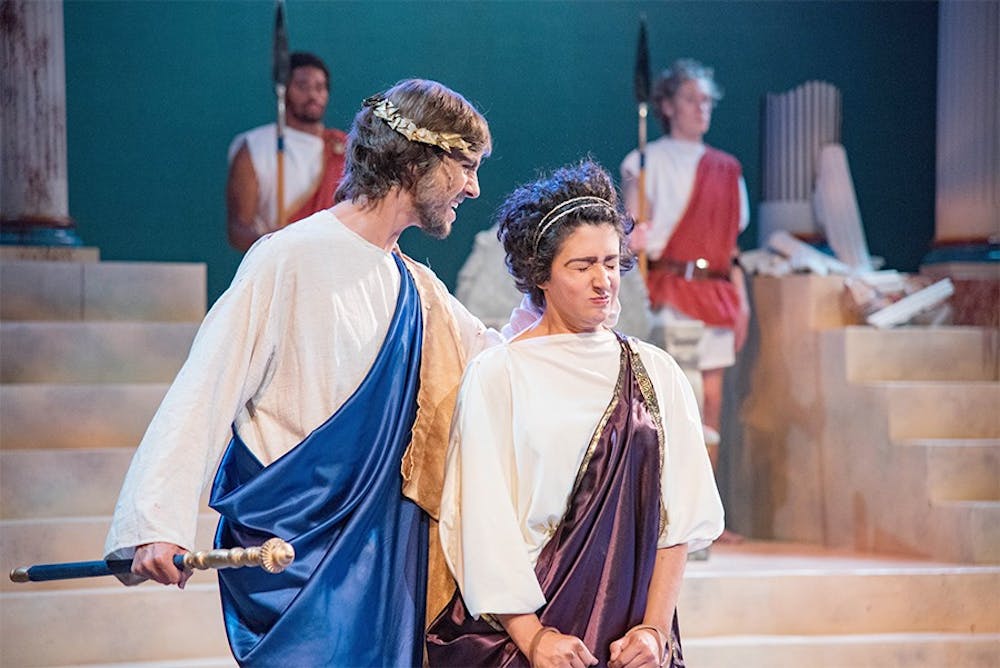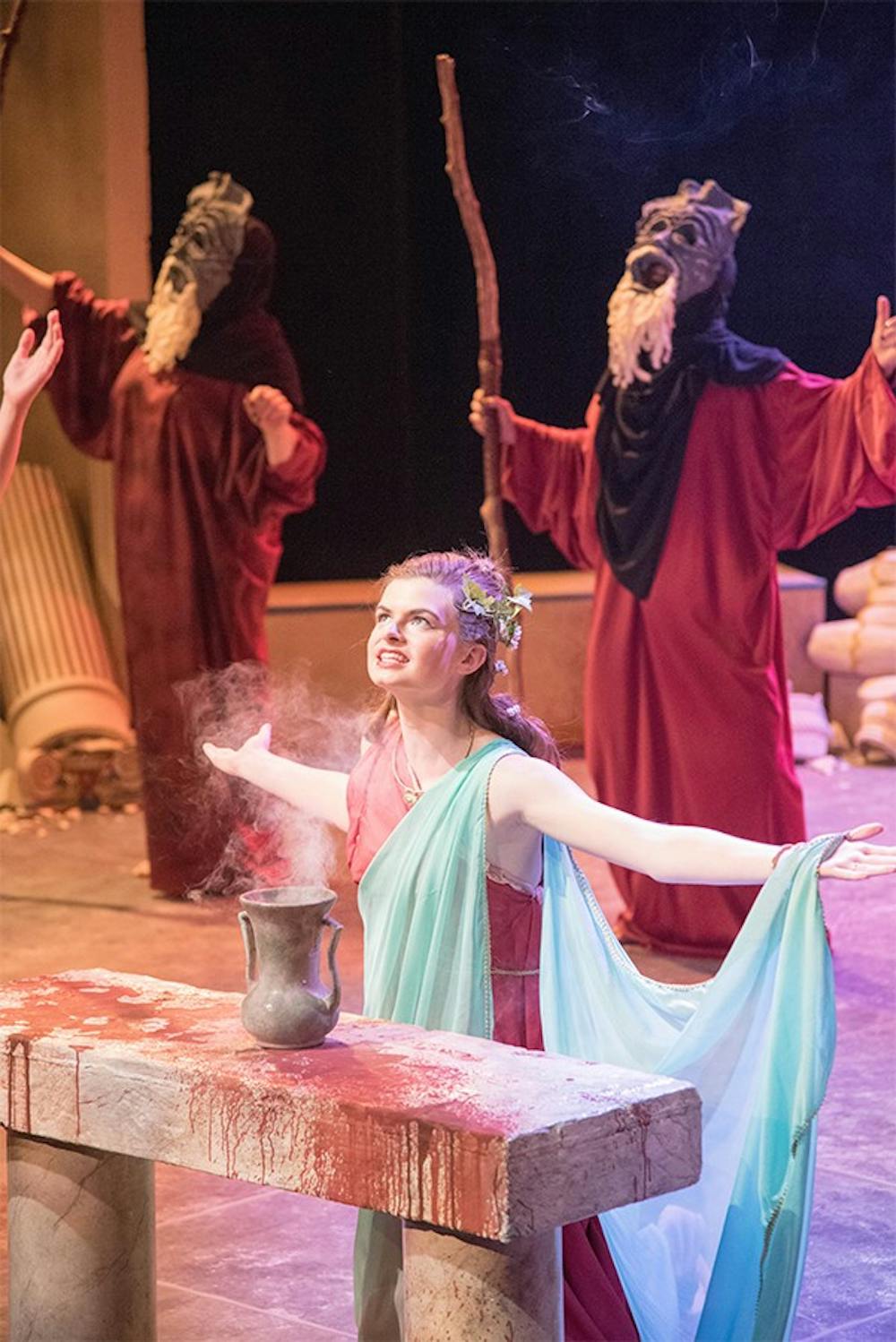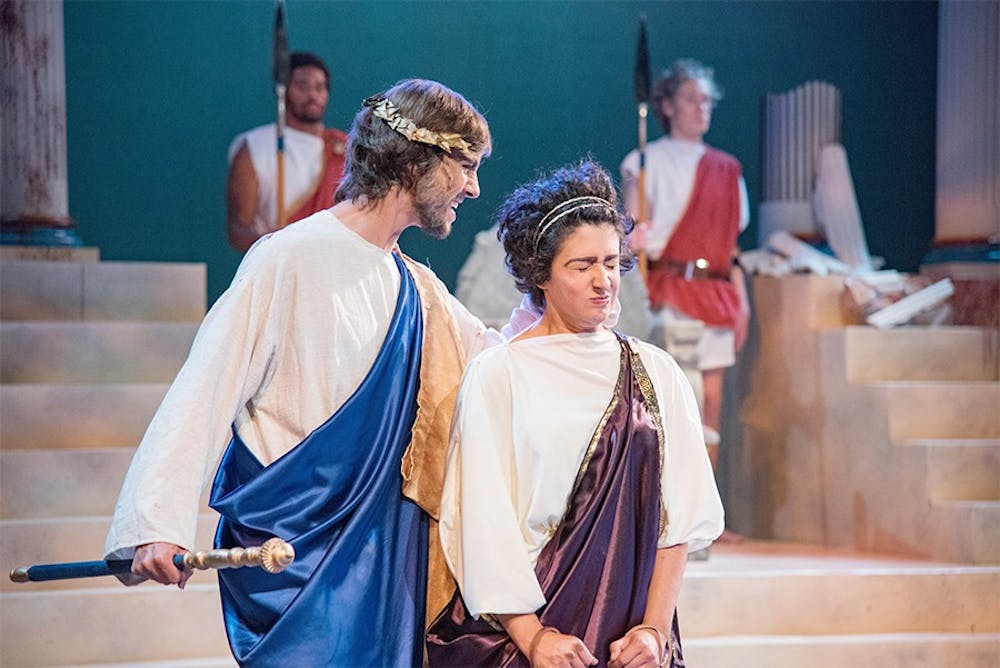By Katelyn Vogel | Contributor

"Antigone" has been categorized as a Greek tragedy, and rightly so, but Sophocles' complex account of mournful events does more than make the audience cry. Thebes is a place of death, celebration, fear and love, all unfolding before the altar of the gods. Taylor University's theatre's performance, translated and directed by professor of English, Joseph Ricke, asks the audience to have courage and stare into the ugly sides of humanity. But don't dismay too soon, because love, wisdom and holiness glint in the dark.
Creon, enlivened by senior Sean Sele, claims the throne in Thebes and immediately clenches on the power. He struggles to listen to reason and defies the gods. Polyneices, Antigone's brother, died in battle, and Creon refuses to honor his death with a burial. Throughout the show, his rage builds as his reason weakens. He creates a tangible tension between love of self and love of the gods. The consequences are tragic.
Sele has found it hard to step out of character after performing: "(It's hard) because of the heavy weight he carries, (too) heavy for any human to carry." Sele portrays this weight through a remarkable range of emotional responses that will have viewers leaning forward in their chairs.

Senior Alexis Colón has transformed herself into Antigone. Her character catalyzes events, as she is determined to honor both the gods and her brother through a makeshift burial. It is not just the bold words she speaks that moves the audience to empathy but her convictions to do what must be done-the law is no limit to her. Alexis said she was surprised at how brave Antigone is. The audience will be too.
In contrast, Antigone's sister, Ismene, survives through fear. Freshman Evangeline Bouw makes a stunning debut to Taylor's theatre in her portrayal of Ismene, beautifully executing the character's grief. Antigone pleads with her sister to commune in burying their brother, but Ismene is burdened by the grip of the law. The prophet Teiresias played by sophomore Bradley Jensen, who only fears the gods, counters this heaviness. The eerie clanking of charms on his staff matches his potent protestations against Creon's edict.
One of the most trying conflicts arises between father and son. Family dynamics become tense when Haimon, Creon's son, discovers Antigone is condemned to death. She is Haimon's fiancée. Reason sharpens their dynamic arguments, and family loyalty crumbles in the oversaturation of love and hate. Freshman Brandt Mwaura compels Haimon forward into justified anger, rejecting his corded crown.
When considering his character, Mwaura asked, "What are different ways you can approach conflict?" This is key to reading the methods and angles Mwaura employs in Haimon while pleading with his father.
If you are concerned "Antigone" will only deal with death, betrayal and more death (for those looking forward to a ridiculous number of deaths, never fear), junior Grace Foltz provides comic relief as the blubbering sentry. The sentry embodies the tension between the law and his conscience, contrasting Creon and Antigone's resolute views. Although Foltz infuses a lighter note to Sophocles' tragedy, her character is no less complex. Watching her reason through her choices externally is both entertaining and enlightening.
The most haunting aspect of this performance is spotlighted through the Elders. Senior Rachel Erskine, juniors Ty Kinter and Tamara Peachy, and freshmen Darah Shepherd and Steven Mantel portray the fear through their movements and Gregorian-like chants. Their holy devotion to the gods, however, is undercut by pleasing Creon. With masked faces, they hide behind their actions by appeasing whoever holds the most power. The altar of the gods is ever-present on set and serves as the epicenter of all activity. Although splattered in blood, the altar becomes a place of celebration, dance and beauty when Eurydice (sophomore Hope Bolinger) and her attendants (junior Hillary Foreman and senior Abby Palmisano) glide across the stage. This paradox serves many symbols as the show progresses, but there is a stark contrast between veneration and dishonor.
Those familiar with Ricke's work won't be surprised to see his admiration for Shakespearean theatre in this production. There are no blackouts or interruptions in transitions from scene to scene, which lends itself to fluidity throughout the show. This also reflects the characters' experiences in a realistic way, since they don't have the choice to cut the lights to prepare for their next entrance.
In this adaptation of Antigone, every character provides insights into the human experience. Senior Andrew Davis, the Messenger, expresses, "You begin to see each play as an opportunity to engage with a new author, a new corner of culture." Although Sophocles' time may have different sights and sounds, some themes are unavoidable and enduring, such as state versus the church, love versus hate, life versus death, holiness versus defilement, loyalty versus betrayal.
Greek culture approaches these motifs differently than we would today, but by leaning in, audience members will see that the characters' responses, flaws and philosophies are not far from their own. As Ricke said, "This is Antigone. I don't want anyone to sit back, relax and enjoy the show." So be brave, engage and linger in the questions presented by "Antigone."





